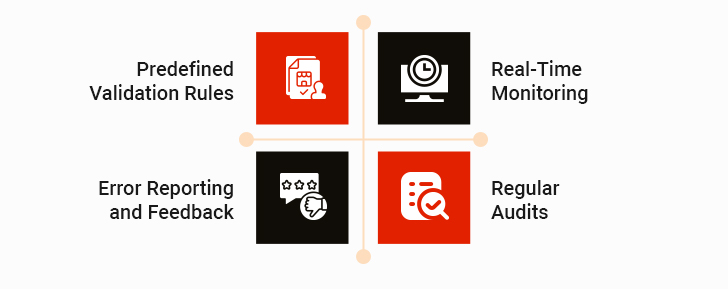Data is the backbone of businesses today and ensuring its accuracy is non-negotiable. A Gartner study mentions that businesses lose around $12.9 million every year due to low data quality, underscoring the importance of strong data validation procedures.
As a Chief Information Officer (CIO), you are responsible for overseeing and protecting your company’s data resources. Utilizing automated data validation services can greatly improve data accuracy, optimize processes, and facilitate sound decision making.
This comprehensive guide will walk you through the essentials of automated data validation, offering practical guidance in achieving data accuracy in your organization.
Table of Contents
Why Automated Data Validation Matters
The Role of Technology in Data Validation
Key Components of Automated Data Validation
Best Practices for Automated Data Validation
- Maintain Data Governance
- Update Validation Rules
- Engage Cross-Functional Teams
- Leverage Data Enrichment
How to Implement Automated Data Validation
- Assess Current Data Quality
- Define Objectives
- Choose the Right Tools
- Develop Validation Workflows
- Train Your Team
What is Data Validation?
Data validation is the process of ensuring that data is accurate, complete, and reliable before it’s used for analysis or decision-making. It involves verifying data against predefined rules or criteria to identify and correct errors, inconsistencies, or anomalies.
Data validation is the procedure of verifying that data is correct, thorough, and dependable prior to its utilization for analysis or decision-making. It includes checking data with set rules to find and fix mistakes, discrepancies, or irregularities.
Manual validation methods are no longer adequate due to the increasing complexity of business operations and the large volumes of data coming from different sources. Automating this process saves time and decreases the likelihood of human mistakes, resulting in more dependable outcomes.
Why Automated Data Validation Matters
1. Efficiency
By automating repetitive validation tasks, data processing is sped up, enabling your team to concentrate on strategic initiatives. For example, a retail business that handles millions of customer transactions every day can utilize automated tools to process and authenticate data in real time, leading to quicker response times and enhanced service delivery.
2. Consistency
Manual data validation often leads to inconsistencies due to human error. Automated systems apply validation rules uniformly, ensuring consistent data quality across the organization. This uniformity is especially critical for businesses operating in multiple geographies, where compliance and data standards may vary.
3. Scalability
As your data volume grows, automated validation can easily scale to handle increased workloads without compromising accuracy. Whether you’re managing a startup with growing customer data or a multinational corporation, automated tools provide the flexibility to expand effortlessly.
4. Cost Savings
Poor data quality has a ripple effect on business costs. From inaccurate reporting to poor decision-making, the financial implications can be significant. Automated validation reduces manual intervention, lowering operational costs and minimizing the financial impact of data errors.
The Role of Technology in Data Validation
A) AI and Machine Learning
Advanced AI algorithms can identify patterns and detect anomalies in data, automating the validation process even for complex datasets. For example, a financial institution can use AI-driven validation to detect fraudulent transactions by flagging inconsistencies in data patterns.
B) Cloud-Based Validation Tools
Cloud-based data validation services offer flexibility and accessibility. QuerySurge,Talend, Informatica, ICEDQ, Datagaps ETL Validator, Datameer, and DbFit are some of the key data validation tools to drive expected business outcomes. These tools allow businesses to validate data in real time, regardless of location. They also integrate seamlessly with existing cloud platforms, ensuring a unified approach to data management.
C) Integration with Existing Systems
Automated tools can be integrated with ERP, CRM, and other enterprise systems to ensure data accuracy at every stage of the workflow. This integration reduces redundancies and enhances operational efficiency.
Key Components of Automated Data Validation
I) Predefined Validation Rules
Establish specific measures to ensure the accuracy of data, including verification of data format, range, and consistency. For instance, ensuring that customer email addresses adhere to standard formatting rules, thereby avoiding mistakes in email campaigns.
II) Real-Time Monitoring
Implement systems that are consistently monitoring the quality of data, identifying and resolving any problems that may occur. Continuous monitoring is particularly important in sectors such as ecommerce, where timely data is essential for managing stock and fulfilling customer orders.
III) Error Reporting and Feedback
Create robust systems for reporting to identify mistakes and offer actionable feedback. These reports assist teams in recognizing frequent issues and improving validation rules as time goes by.
IV) Regular Audits
Perform scheduled data audits to assess the effectiveness of validation procedures and proactively resolve any shortcomings.
Need help with eliminating data inaccuracies and transforming your database to meet your business goals?
Best Practices for Automated Data Validation
1. Maintain Data Governance
Develop unambiguous policies and guidelines to ensure data validation conforms with industry norms and regulations. This involves complying with GDPR, CCPA, and other regulations.
2. Update Validation Rules
Validation criteria should be adjusted to incorporate new data sources, formats, and requirements as your business grows and changes. For instance, including guidelines for validation of social media data in your marketing strategy ensures uniformity on all channels.
3. Engage Cross-Functional Teams
Engage stakeholders from IT, marketing, finance, and other functions to make sure validation processes align with various needs of the organization.
4. Leverage Data Enrichment
Integrate validation alongside data enrichment methods to improve the overall quality of your datasets. For example, enhancing customer data with geolocation details can enhance personalization initiatives.
How to Implement Automated Data Validation
A) Assess Current Data Quality
Perform a thorough assessment of your existing data to detect recurring mistakes and pinpoint opportunities for enhancement. This evaluation gives a starting point for assessing the impact of automated validation.
B) Define Objectives
Establish specific objectives for your validation efforts. Having clear goals in place helps ensure that various teams are on the same page, whether they are focused on improving reporting accuracy or making customer onboarding more efficient.
C) Choose the Right Tools
Choose tools that can easily connect with your existing systems. For instance, teaming up with a reliable data validation company grants you access to advanced technologies and domain expertise customized for your requirements.
D) Develop Validation Workflows
Create processes that automate data entry, validation checks, and error management. These processes need to be able to grow and change based on future business requirements.
E) Train Your Team
Offer training sessions to introduce your team to the new tools and processes, ensuring a seamless transition and increasing adoption.
Say Goodbye to Errors! Leverage Automated Data Validation Services for Flawless Results
Primary Use Cases of Automated Data Validation
1. RegTech
Embedding quality checks at critical workflow junctures improves overall data integrity and accuracy, ensuring regulatory compliance and reducing manual labor costs.
2. Retail
Cleaning customer data from various sources enhances email campaign accuracy and reduces customer attrition.
3. Financial Services
AI-powered validation identifies irregularities in transaction data, significantly reducing fraudulent cases.
4. Healthcare
Verifying the accuracy of patient records improves treatment outcomes and ensures compliance with health regulations.
Finding the Right Validation Services Partner
Partnering with niche firms offering data validation services can improve the effectiveness of your data validation system. These vendors offer domain-specific solutions and cutting-edge tools to help your organization tackle its individual challenges. Moreover, businesses can concentrate on their primary tasks and keep up data quality by outsourcing data verification services.
Businesses need to prioritize automated data validation services in order to excel in the current competitive business environment. Organizations can realize the full potential of their data assets by utilizing cutting-edge tools, following industry standards, and collaborating with external partners.
By utilizing the right technologies and industry expertise, you can turn data validation to your strategic benefit. Both partnering with a data validation company or integrating advanced tools are ways to start the journey towards data accuracy and desired business outcomes.
Automated data validation is the future, and the time to act is now. Adopt this transformative approach and prepare your organization for success in a world that is becoming more focused on data.







